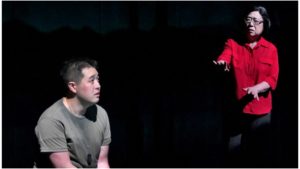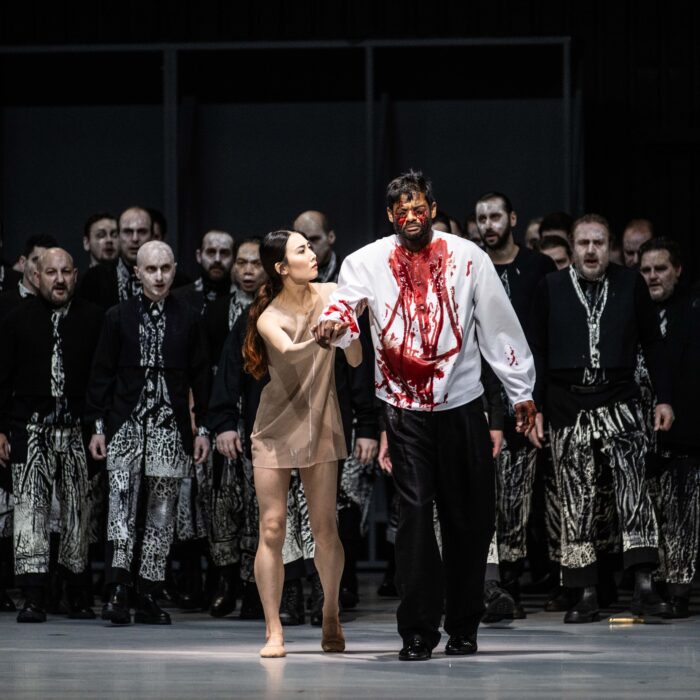
Opera Theatre of St. Louis 2018 Review – An American Soldier: A Moving Tribute To The Distressing Death of Private Danny Chen
By Santosh VenkataramanThere is only one point in which the character of Private Danny Chen leaves the stage in composer Huang Ruo and librettist David Henry Hwang’s “An American Soldier,” seen in its world premiere this past weekend at Opera Theatre of St. Louis. It is near the end when the soldier dies and his final words when alive are as such:
“Who is on my side? Who are my enemies? I’m an American. What is an American?”
These are the questions left unanswered in the wake of this work, just as the 2011 real-life death of Pvt. Chen as a 19-year-old in Afghanistan while serving with the United States Army is similarly ambiguous. The military claimed it was a suicide and the family contests that to this day, and it is Chen’s questions of identity that are the driving force for this opera in which the tragedy is felt even sharper because of the recency of the story.
First Seen in Washington in 2014
“An American Soldier” was commissioned by Washington National Opera as a 60-minute chamber opera four years ago as part of that company’s American Opera Initiative. Opera Theatre of St. Louis had already begun its New Works, Bold Voices program a year earlier and it was only natural for that series and this work to find a collaboration that was ideal for both parties.
Ruo and Hwang expanded the work to two acts consisting of 11 scenes depicted in a series of flashbacks. The main set is a courtroom for the court-martial of the soldiers who hazed the Chinese-American Pvt. Chen due to his ethnicity, with the commanding officer on trial depicted in the person of a fictitious Sergeant Aaron Marcum. The real perpetrators received light punishments for the death of their comrade.
The staging by Matthew Ozawa along with artistic director James Robinson also has scenes in Pvt. Chen’s hometown of Chinatown in New York in which he shares time with another fictitious character named Josephine, who represents a friend from childhood. Scenes of his military training in Fort Benning and Fort Wainwright were vividly harsh in showing the unrelenting bullying he faced.
The Other Side of the Immigrant Story
The immigrant story of foreigners coming to the United States and forging successful lives for their children has been fed to Americans’ collective psyche for quite some time. The story of Pvt. Chen’s life seemed destined as another example since he was a bright student with scholarship offers from several universities.
Yet where this story departs is because of how others saw Pvt. Chen as well as how he saw himself. He yearned for something different than a traditional path via the classroom and considered becoming a police officer. Pvt. Chen then saw joining the military as a way to prove himself as an American. In his eyes, his Chinese descent did not make him any different from anyone else born in the United States. It was simply catastrophic that his fellow soldiers did not feel the same way.
The backdrop for his decision also came in the wake of the September 11 terrorist attacks. It’s a poignant moment when he explains to his mother his desire to join the military by saying, “I can’t forget there’s a fight still going on.” Pvt. Chen was a patriot in every sense of the word.
Dream Team Pays Dividends
Ruo’s music is appropriately jarring given this subject featuring sustained intensity throughout with Michael Christie conducting a 35-person orchestra. There are elements of chamber music as well as sounds from Asia based on the pentatonic scale. Ruo told Opera News that he added three didgeridoos for a dramatic effect in the final scene.
Listening to this music over a two-hour period is not to experience a series of ups and downs. Rather it is to incrementally take something away from the listener with the cumulative effect of leaving an audience member emotionally spent by the end. One is worn down by a series of body blows as opposed to a knockout punch by Ruo’s score.
Hwang’s libretto is unsparing in depicting the military as debased men and women who hurl expletives, racial slurs, and homophobic insults with gusto and venom. These soldiers, all youngsters like Pvt. Chen, are not to be ostensibly molded into a supportive unit; instead, it is every man or woman for him or herself. This representation is in direct contrast to how popular culture glorifies the U.S. military as being the “best and the brightest.”
Stenson Stars As Chen
The rising tenor Andrew Stenson created the role of Pvt. Chen in the WNO commission and delivers a brave performance in the extended version. Stenson brings the hopes of dreams of the young man to life by using his lyric voice to efficiently glide through much of the spoken verse.
The Korean-born Stenson joined a cast and team that comprised of many Asian-Americans like Ozawa, Hwang and the Chinese-born Ruo. Soprano Kathleen Kim is another as the sympathetic Josephine while mezzo-soprano Mika Shigematsu charmed as his loving mother, who only wants what is best for her family. Baritone Wayne Tigges convinces as Marcum, a military man who is the product of power run amok.
The ending is brilliantly conceived after Pvt. Chen’s death as a military chorus sings “E pluribus unum.” The United States motto of “out of many, one” is supposed to represent the unity of the country but instead conveys the dual meaning of Pvt. Chen being singled out for abuse among his peers. An evocative lullaby by Shigematsu, in which she implores her deceased son to sleep, follows, showcasing the dead private as a ghost.
“An American Soldier” is blunt in asking what it means to be an American and for Asian-Americans in particular, since they are largely overlooked. Opening night of this world premiere was a stirring and disturbing affair in which Pvt. Chen’s actual mother was in attendance. This sensitive opera provides no easy answers in revealing truths about America that she refuses to face.


